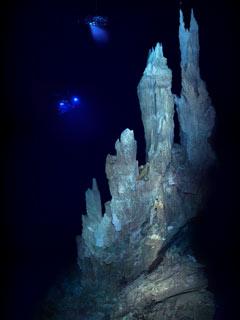
Deep-sea vents could offer a non-biological source of oil and gas.D. KELLEY & M. ELEND, UNIV. WASHINGTON INST. FOR EXPLORATION/URI-IAO/NOAA/THE LOST CITY SCIENCE TEAM
Posted on 01/31/2008 9:42:53 PM PST by neverdem
Hydrocarbons bubble up from the mid-Atlantic's Lost City. 
Deep-sea vents could offer a non-biological source of oil and gas.D. KELLEY & M. ELEND, UNIV. WASHINGTON INST. FOR EXPLORATION/URI-IAO/NOAA/THE LOST CITY SCIENCE TEAM
Undersea thermal vents can yield unexpected bounty: natural gas and the building blocks of oil products. In a new analysis of Lost City, a hydrothermal field in the mid-Atlantic, researchers have found that these organic molecules are being created through inorganic processes, rather than the more typical decomposition of once-living material.
Most of the planet's oil and natural gas deposits were created when decomposing biological matter is 'cooked' in high temperatures underground. But non-biological hydrocarbons have also been found deep inside the Earth, where chemical processes create the molecules from inorganic sources such as rock.
Although researchers have seen some evidence for inorganic production of hydrogen in the ocean, Lost City “is the first really clear example of a marine, deep-sea world where hydrocarbons are being synthesized abiotically,” says Giora Proskurowski of the Woods Hole Oceanographic Institution in Massachusetts, one of the researchers who made the discovery.
The Lost City hydrothermal vents, some of which are 60 metres tall, sit above magnesium- and iron-rich deposits called 'ultramafic' rock. The minerals contained in the rocks interact with water to produce an environment with plentiful hydrogen, making it chemically favourable for the creation of the hydrocarbon molecules that make up oil and gas.
In 2003, Proskurowski and his team descended 800 metres under the waves to collect the liquid bubbling from these vents. The team returned in 2005 with a remotely operated submarine to collect more samples. By analysing carbon isotopes in the hydrocarbons they brought back, the team found that the carbon and hydrogen atoms in the molecules seemed to come from Earth’s mantle and not from biological matter that had settled on the ocean floor. The results of the study are published this week in the journal Science 1.
Bubbling crude Sampling fluids at this depth under the sea can be tricky; collecting just 150 millilitres of fluid requires a container surrounded by more than 9 kilograms of titanium to prevent depressurization, says Proskurowski.
To rule out the possibility that the hydrocarbons collected from the vents were created from biological material, the team analysed several different isotopes.
Among other measurements, the team analysed the amount of carbon-13 in methane, which contains one carbon atom, and in hydrocarbons containing two, three, and four carbon atoms. As the number of carbon atoms rose, the concentration of carbon-13 fell — the opposite trend to that seen in biologically derived hydrocarbons.
Instead, the pattern of isotopes suggest that a chemical process called the Fischer-Tropsch process is at work in Lost City, creating bigger and bigger hydrocarbons in the hydrogen-rich environment. Although the concentrations were too low to detect without a filter, small amounts of larger hydrocarbons such as kerosene and octane may also be produced.
The team also found that the methane in Lost City contained no carbon-14, suggesting the carbon source for the hydrocarbons comes from within the mantle, far away from organisms that might have had contact with the global carbon cycle at the surface.
“There was always some nagging doubt that there could be some biological contribution such as decomposing organic matter,” says Tom McCollom of the Laboratory for Atmospheric and Space Physics at the University of Colorado at Boulder. “This really provides a means of clearing up that uncertainty.”
At this point, McCollom adds, no one knows how many hydrocarbon sources there are in the deep sea, but the types of rocks found in Lost City are widespread in other ocean regions, suggesting that it may be a common phenomenon.
Oh my God, the earth is causing global warming!
The earth is causing climate change!
Ah-Hah! That’s what George Norie has been saying all along.
If only this could be true so we can tell the Arabs and Muslims to drop dead.
Lilly Considers $1 Billion Fine to Settle Case (illegally promoted off-label use of Zyprexa)
FReepmail me if you want on or off my health and science ping list.
ping to self.
You know, it’s completely likely that the fissile materials heating the earth’s core are producing some sort of energetic by-product, like how fast reactors produce plutonium. I don’t know if we’re burning it faster than it replenishes itself, though.
Ping
Perhaps more importantly in the short term, abiotic creation of hydrocarbons may mean that there is much still to be found.
Of course, it just depends on how far you dig. In that case however, the most efficient route is geothermal energy. Drill a hole 10 or 20 miles deep, pour water in and have an almost inexhustible supply of steam power.
Thanks for the links.
Very interesting....we need to put a cap over it...
Thanks neverdem. There may also be an even earlier topic than this one:
Lost City pumps life-essential chemicals at rates unseen at typical black smokers
University of Washington | January 31, 2008 | Unknown
Posted on 01/31/2008 4:28:30 PM EST by decimon
http://www.freerepublic.com/focus/f-news/1962790/posts
Thanks for the link.
Since when is the biological origin of “most” oil and gas anything more than a theory?
My grandfather taught me all this in the 60s when plate tectonics was being worked out.
my pleasure. :’)
Shedding light on deep-sea thermal vents
Cosmos magazine | Thursday, January 10, 2008 | Agence France-Presse
Posted on 01/15/2008 3:20:49 PM EST by SunkenCiv
http://www.freerepublic.com/focus/f-chat/1954189/posts
Disclaimer: Opinions posted on Free Republic are those of the individual posters and do not necessarily represent the opinion of Free Republic or its management. All materials posted herein are protected by copyright law and the exemption for fair use of copyrighted works.